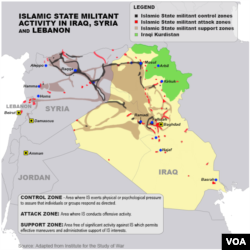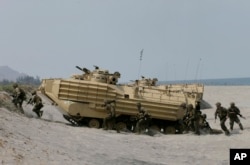A new poll suggests the world largely supports both the U.S. defense shift toward Asia and the U.S.-led military campaign against the Islamic State group, two centerpieces of the White House's foreign policy efforts.
The United States' overall ratings also remain mostly positive, according to the Pew Research Center poll, which looked at public opinion in 40 nations. A global median of 69 percent expressed a favorable opinion of the country.
The figures are likely to be interpreted as a success by the Obama administration, which came to power in 2008 promising to improve the U.S.' global image in part by ending military entanglements in Afghanistan and Iraq.
The White House since has been drawn back into the region by the rapid advance of Islamic extremists in Iraq and Syria, where the U.S. is now carrying out a steady campaign of airstrikes and attempting to train forces it sees as allies.
Islamic State
“There’s a lot of support globally for the U.S. campaign against ISIS in Iraq and Syria," said Richard Wike, director of Global Attitudes research at Pew, who helped write the report. "Across the countries we surveyed, a median of 62 percent support the U.S. campaign. Just 24 percent say they oppose it.”
Wike said some of the strongest support for the campaign comes from Europe and the Middle East, in contrast to widespread opposition to the U.S.-led invasion of Iraq more than a decade ago.
However, Pew found continuing disapproval of the harsh interrogation techniques used against terrorism suspects following the 9/11 attacks.
“Around the globe, there’s a lot of opposition to those techniques," he said. "A median 50 percent across the countries where we asked this question said that they thought these [techniques] by the U.S. government were not justified.”
The poll found strong support for the U.S. decision to place a greater military priority on the Pacific, where many countries feel they are being challenged by China's growing economic might, military power and assertiveness.
“By and large, people tended to say that this was a good thing, that they see a U.S. military presence in the region as being something that encourages stability," Wike said.
Overall, a global median of 51 percent support increased U.S. military resources in Asia, compared to 34 percent who said they are opposed. Support for the pivot was particularly high in the Philippines, Vietnam and Japan, all of which have territorial disputes with China.
One exception was Malaysia, "where 54 percent believe [the U.S. defense pivot] is a bad thing because it could lead to conflict with China," according to Pew.
TPP support
Worldwide support also appears to be strong for another part of the Obama administration's renewed focus on Asia: the proposed Trans-Pacific Partnership (TPP) free trade agreement, which would include 12 countries and 40 percent of the world's GDP.
Pew surveyed nine of the countries involved in the TPP negotiations, and found that a median of 53 percent view the deal as positive for their country, compared to 23 percent who say it would be negative.
However, support for the TPP was among the lowest in the U.S., where the trade legislation has become stalled in Congress. Less than half, 49 percent, of Americans surveyed said the deal was a "good thing."


